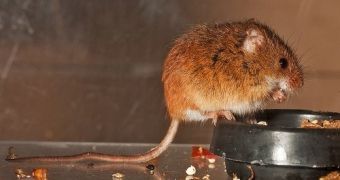The typical American-style diet is full of high fat and cholesterol levels and, according to a new research conducted by scientists at the Kimmel Cancer Center at Jefferson, it plays a very important role in the growth and spread of breast cancer.
The researchers used a mouse model to analyze the role of fat and cholesterol in breast cancer development.
The study concluded that mice that were predisposed to mammary tumors and were fed a Western diet, risked developing lager, faster growing tumors that metastasize more easily that animals on a controlled diet.
Cancer biologist Philippe G. Frank, PhD, Assistant Professor in the Department of Stem Cell Biology and Regenerative Medicine at Thomas Jefferson University and leader of the research, was very interested in finding the connection between diet and breast cancer.
For this, the team worked on the PyMT mouse model, since it is believed to be very close to the human parameters of breast cancer.
PyMT mice were placed on a diet that contained 21.2% fat and 0.2% cholesterol – a typical Western diet, while a control group of PyMT mice was fed a normal chow, with only 4.5% fat and insignificant amounts of cholesterol.
During the study period, the researchers discovered that mice fed the fat/cholesterol-enriched chow, started to quickly develop tumors.
The number of these tumors was almost the double of those found in mice eating a normal diet, and they also were 50% larger.
Dr Frank said that “the consumption of a Western diet resulted in accelerated tumor onset and increased tumor incidences, multiplicity, and burden, suggesting an important role for dietary cholesterol in tumor formation.”
He added that the mice fed the fatty diet also had an increasing number of lung metastasis.
The researcher examined the links between cholesterol, diet, and cancer in an animal model of human cancer, because diet-based studies in humans have contradicted the fact that dietary fat and cholesterol are important risk factors for certain tumor types.
Breast cancer is five times more frequent in Western countries than it is in other developed states, and to that, adds the fact that breast cancer incidence in immigrant populations that relocate from a low-incidence region, is increasing too.
“These facts suggest strong environmental influence on breast cancer development,” Dr. Frank says.
“These data provide new evidence for an increase in cholesterol utilization by breast tumors and thus provides many new avenues for prevention, screening, and treatment.”
To explain the effect of cholesterol of breast cancer, the Dr explains it this way: “in a neighborhood, if you want to build more houses, you need more bricks.
“In tumors, cholesterol provides the bricks that are the foundation for further growth, and this cholesterol comes from the blood.
“A drop in blood cholesterol may signify that some tumors are growing as cholesterol provides support for breast cancer growth.”
And since the same research team discovered the same connection between cholesterol and growth of prostate cancer in mice, in a study published in the December issue of The American Journal of Pathology, it looks like “cholesterol does indeed seem to be an important factor in the regulation of tumor formation in several cancer types.”
This study was published in the January issue of The American Journal of Pathology.

 14 DAY TRIAL //
14 DAY TRIAL //